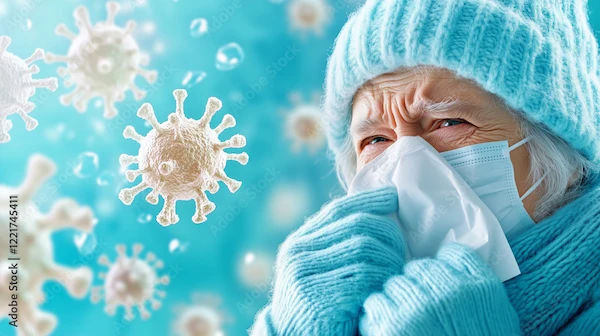Avoid Common Winter Illnesses: Prevention, Symptoms & Treatment
Learn how to prevent common winter illnesses with effective tips on hygiene, immunity-boosting foods, home remedies, and when to seek medical attention.

Written by Dr.Sonia Bhatt
Last updated on 3rd Jul, 2025

Winter brings chilly temperatures, cozy sweaters, and festive cheer. But it also increases the risk of seasonal illnesses that can leave you feeling miserable. From the common cold and flu to more severe conditions like pneumonia and bronchitis, winter ailments affect people of all ages. If you find yourself sniffling, coughing, or feeling unwell every winter, you’re not alone. Cold weather impacts your health in several ways. Lower temperatures weaken your immune system, making infections easier to catch. Dry air irritates nasal passages, increasing vulnerability to viruses. Spending more time indoors raises the risk of germ transmission, while colder temperatures can also affect circulation, heightening heart health risks.
Understanding why winter illnesses spike and how cold weather affects your body can help you take preventive steps. Dressing warmly, eating nutritious foods, and maintaining good hygiene can go a long way in keeping you healthy throughout the season.
Common Winter Illnesses
Winter brings a drop in temperatures—and a rise in seasonal illnesses. You may notice more people coughing, sneezing, or feeling fatigued during this time. The combination of weakened immunity, dry air, and increased indoor gatherings makes infections spread easily.
1. Cold and Flu
The common cold and flu are the most widespread winter illnesses. You may experience:
Runny nose, congestion, and sneezing (common cold).
High fever, body aches, and fatigue (flu).
Flu symptoms are more severe and can lead to serious complications, especially in older adults.
2. Respiratory Infections
Cold air and dry conditions irritate the respiratory system, making infections more common. You may be at risk for:
Bronchitis – Causes persistent coughing and chest discomfort.
Pneumonia – A severe lung infection that can lead to breathing difficulties.
3. Seasonal Allergies
Winter allergies can mimic cold symptoms, making them hard to differentiate. Common triggers include:
Dust mites and pet dander from spending more time indoors.
Mold growth in damp winter conditions.
If your sneezing, congestion, or itchy eyes last for weeks, allergies might be to blame.
Symptoms of Winter Illnesses
Recognising early symptoms of winter illnesses helps you take quick action and prevent complications.
1. Recognising the Signs of Common Colds
Colds develop gradually and typically include:
Sneezing and runny nose with mild congestion.
Low-grade fever (if any).
Mild cough that clears in a few days.
Most colds improve with rest, fluids, and over-the-counter remedies.
2. Identifying Respiratory Infection Symptoms
If your symptoms worsen or last longer than 10 days, you may have a respiratory infection. Watch for:
Persistent cough with mucus (bronchitis).
Shortness of breath and sharp chest pain (pneumonia).
High fever and chills that don’t subside.
If you experience severe symptoms, seek medical help immediately.
Prevention Strategies
Staying healthy during winter is possible with simple yet effective preventive measures.
1. Importance of Vaccinations
Getting vaccinated before winter can protect you from severe infections:
Flu vaccine – Reduces the risk of flu-related complications.
Pneumonia vaccine – Recommended for older adults and those with weak immunity.
COVID-19 boosters – Prevent serious respiratory issues.
Vaccines help your immune system fight off infections more efficiently.
2. Hygiene Practices to Stay Healthy
Good hygiene can reduce the spread of viruses and bacteria. Make sure to:
Wash your hands regularly with soap.
Use hand sanitisers when soap isn’t available.
Cover your mouth and nose when sneezing or coughing.
Avoid touching your face to prevent germs from entering your system.
Simple habits like keeping your surroundings clean and disinfecting commonly touched surfaces can significantly reduce your risk of illnesses.
Boosting Immune System
A strong immune system is your best defense against winter illnesses. When your immunity is weak, viruses and bacteria can easily attack your body, leading to colds, flu, and other infections. Simple lifestyle changes can help you strengthen your immunity and stay healthy throughout the season.
1. Role of Diet in Immune Health
Eating the right foods provides essential nutrients that keep your immune system strong. Some of the best immune-boosting foods include:
Citrus fruits like oranges and lemons, which are rich in vitamin C.
Garlic and ginger, known for their antibacterial properties.
Nuts and seeds, which contain zinc to support immune function.
Yogurt and fermented foods, which promote gut health and better immunity.
Staying hydrated and avoiding excessive sugar intake also help keep your body in top condition.
2. Benefits of Regular Exercise
Exercise keeps your immune system active and helps fight off infections. Engaging in regular physical activity:
Improves blood circulation, allowing immune cells to reach infections faster.
Reduces stress, which can weaken immunity.
Enhances lung function, making it easier to fight respiratory illnesses.
Even in winter, light activities like stretching, yoga, or a brisk walk can keep your immune system strong.
Staying Warm and Safe
Cold temperatures can put extra strain on your body, increasing the risk of hypothermia, frostbite, and respiratory illnesses. Staying warm and taking safety precautions can help you stay comfortable and healthy throughout winter.
1. Proper Clothing for Winter
Dressing appropriately for winter is essential to prevent cold-related illnesses. You should:
Wear multiple layers of clothing to trap body heat.
Cover your extremities with gloves, scarves, and warm socks.
Choose moisture-wicking fabrics to stay dry and avoid chilling.
Use insulated footwear to protect against cold surfaces.
Dressing warmly helps maintain your body temperature and reduces the risk of catching colds or flu.
2. Home Heating Safety Tips
Keeping your home warm is important, but improper heating can lead to accidents and health hazards. To stay safe:
Ensure ventilation when using gas or kerosene heaters to prevent carbon monoxide buildup.
Keep flammable items away from heaters and fireplaces.
Use heating pads cautiously to avoid burns.
Regularly check your heating systems for any issues.
Following these precautions ensures warmth without compromising safety.
Home Remedies and Treatments
If you develop mild winter symptoms, simple home remedies and treatments can provide relief before seeking medical attention.
1. Effective Home Remedies for Relief
Many natural remedies that can help you relieve winter illnesses. Some of the most effective include:
Drinking warm honey and ginger tea to ease throat irritation.
Gargling with salt water to relieve sore throat and kill bacteria.
Using steam inhalation with eucalyptus oil to clear nasal congestion.
Resting and staying hydrated to speed up recovery.
These remedies can help you ease discomfort and prevent your symptoms from becoming worse.
2. Over-the-Counter Treatments
If symptoms persist, over-the-counter (OTC) medications can provide relief:
Pain relievers like ibuprofen or paracetamol for fever and body aches.
Cough syrups or lozenges to soothe throat irritation.
Decongestants to reduce nasal congestion and improve breathing.
Antihistamines for allergy-related sneezing and congestion.
While OTC treatments can help, it’s best to consult a doctor if symptoms become severe or don’t improve within a few days.
When to Seek Medical Attention?
Mild winter illnesses can often be managed at home, but some symptoms require urgent medical care. Ignoring severe symptoms can lead to complications, making it essential to know when to seek professional help.
1. Identifying Severe Symptoms
You should consult a doctor if you experience:
High fever (above 102°F) that doesn’t improve with medication.
Shortness of breath, wheezing, or chest pain.
Persistent cough lasting more than three weeks.
Severe fatigue, body aches, or unexplained weakness.
Vomiting, dehydration, or difficulty keeping food down.
These symptoms may indicate serious conditions like pneumonia, bronchitis, or complications from flu and require immediate medical attention.
2. Importance of Timely Medical Intervention
Early diagnosis and treatment can prevent worsening of symptoms and reduce the risk of complications. If symptoms persist or worsen despite home remedies and over-the-counter treatments, visiting a healthcare professional is the safest option. Timely intervention ensures a quicker recovery and prevents the spread of contagious illnesses.
Children's Health in Winter
Children are more vulnerable to winter illnesses due to their developing immune systems. Special care is required to keep them healthy and protect them from seasonal infections.
1. Special Considerations for Children
Winter illnesses can be more severe in young children. Watch out for:
Frequent colds and respiratory infections due to weaker immunity.
Increased risk of dehydration from fever and vomiting.
Skin issues like dryness and rashes caused by cold weather.
Higher exposure to viruses in schools and daycare centers.
Ensuring children get proper nutrition, hydration, and warmth can help them stay healthy.
2. Preventive Measures for Kids
To protect your children from winter illnesses, you should:
Ensure they wear warm clothing, including hats and gloves.
Teach proper handwashing habits to prevent germ spread.
Keep them hydrated and offer immune-boosting foods.
Ensure they get enough sleep for a stronger immune system.
Limit their exposure to crowded places during flu season.
Taking these precautions can help prevent your kids from falling sick during winter.
Conclusion
Winter illnesses can be prevented with simple yet effective measures. Proper hygiene, vaccinations, a healthy diet, and staying warm can significantly reduce the risk of colds, flu, and respiratory infections. Recognising early symptoms and taking prompt action can make a big difference in recovery.
Staying healthy in winter is not just about avoiding illnesses but also about building long-term immunity. Practicing good hygiene, staying active, and making smart lifestyle choices can help you and your family enjoy the season without frequent health concerns. If symptoms persist, consulting a doctor is always the best step for proper diagnosis and treatment.
Consult Top General Physician
Consult Top General Physician

Dr. Sandhya Chandel
General Physician/ Internal Medicine Specialist
16 Years • MBBS, MD (Int. Med.), IDCCM
Bilaspur
Apollo Hospitals Seepat Road, Bilaspur
(125+ Patients)

Dr. Mohamed Azeem
General Physician/ Internal Medicine Specialist
2 Years • MBBS,MD(Internal Medicine) CCEBDM
Karaikudi
Apollo Hospitals Karaikudi, Karaikudi

Dr. Dhanraj K
General Physician/ Internal Medicine Specialist
25 Years • MBBS, MD Internal Medicine - Osmania Medical College, Hyderabad
Hyderabad
Apollo Hospitals Jubilee Hills, Hyderabad
(375+ Patients)

Dr Bhargav Vuppumalla
General Physician/ Internal Medicine Specialist
5 Years • MBBS MD GENERAL MEDICINE
Bengaluru
Apollo Medical Center, Marathahalli, Bengaluru
Dr P Sai Avinash
General Physician/ Internal Medicine Specialist
5 Years • MBBS
Bengaluru
Apollo Medical Center, Marathahalli, Bengaluru




